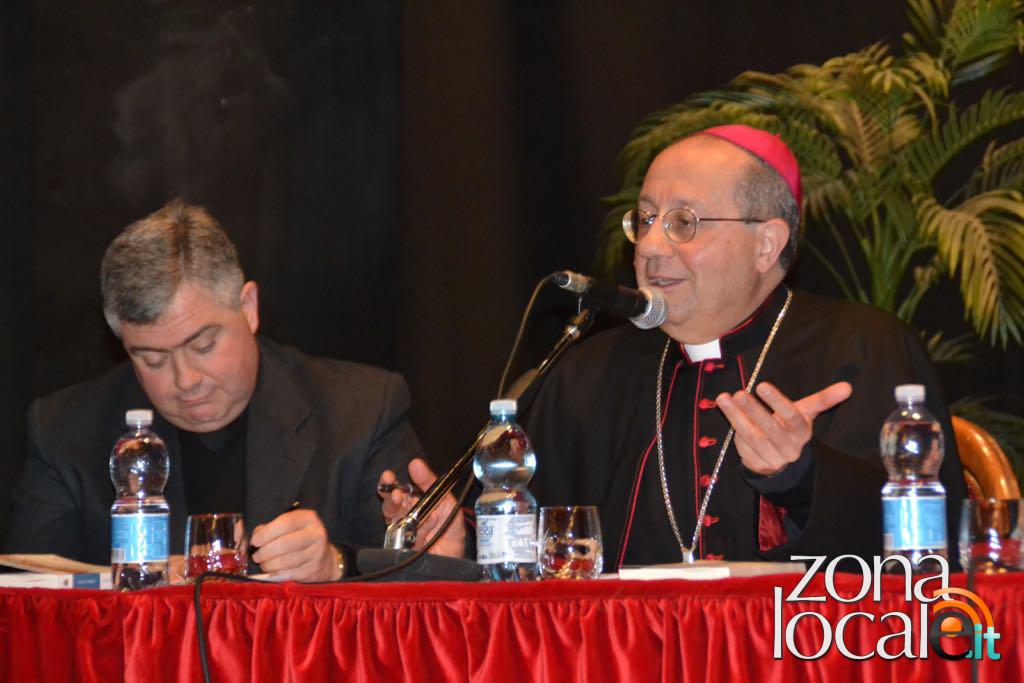
At a meeting to discuss the apostolic exhoration Amoris Laetitia, Archbishop Bruno Forte revealed new insights into the mind of Pope Francis on one of the most controversial issues facing the Church: communion for the divorced and “remarried.” Forte was the man personally chosen by Pope Francis as the Special Secretary for the synods on marriage and family, and he is widely believed responsible for the insertion of the explosive language pertaining to homosexuals in the 2014 Synod’s mid-term relatio.
During his presentation, the details of which were published on 3 May on the Italian news website, Zonalocale.it, Forte recalled certain discussions that were had during the Synod. The following is our (excerpted) translation with emphasis added:
“Not a new doctrine, but the merciful application of that ‘old wine’ that, as is known, is always the best.” Thus Monsignor Bruno Forte, archbishop of the diocese of Chieti-Vasto, during the encounter at the Teatro Rossetti on Pope Francis’ Apostolic Exhortation Amoris Laetitia, which has marked a fundamental passage with regard to the family, “between crisis and desire.” A crisis, on account of the facts related by the same Monsignor Forte, which see marriages diminishing and cohabitation increasing, but also the desire to see the family as the “womb and the school of humanity”…
In the reflection of Monsignor Forte: the causes of the “crisis of the family,” from lack of work to housing problems, the phenomenon of migration, to the difficulties attached to “material and human misery.” In this context, the sense of the apostolic exhortation of Pope Francis [is]: “Don’t judge, but reach out to all with the gaze of mercy, but without renouncing the Truth of God. It is easy to say, ‘that family has failed’; more difficult to help it not to fail. No one ought to feel themselves excluded from the Church.”
An approach that naturally has “practical” repercussions in the area of direct indications for pastors and the ecclesial community. Archbishop Forte has in fact revealed a “behind the scenes” [moment] from the Synod: “If we speak explicitly about communion for the divorced and remarried,” said Archbishop Forte, reporting a joke of Pope Francis, “you do not know what a terrible mess we will make. So we won’t speak plainly, do it in a way that the premises are there, then I will draw out the conclusions.”
“Typical of a Jesuit,” Abp Forte joked, attributing to that suggestion a wisdom that has allowed the maturation necessary to conclude that Amoris Laetitia, as Abp. Bruno Forte explained, does not represent a new doctrine, but the “merciful application” of that [the doctrine] of all time.
What is most important to note is the fact that Forte, by Francis’ personal choice and appointment Special Secretary to the Synod, is stating — publicly, and without apparent concern for consequence — that the Pope intentionally manipulated the synodal process — against the will of the Bishops –to get an outcome that he knew would not be otherwise acceptable.
(English translation provided by Roberto Tommaso. The original Italian of our excerpted translation follows):
“Non una nuova dottrina, ma l’applicazione misericordiosa di quel ‘vino vecchio’ che, come si sa, è sempre il più buono”. Così monsignor Bruno Forte, arcivescovo della diocesi Chieti-Vasto, durante l’incontro presso il Teatro Rossetti sull’Esortazione Apostolica di Papa Francesco “Amoris laetitia”, che ha segnato un passaggio fondamentale per quanto riguarda la famiglia, “tra crisi e desiderio”. Crisi, per quel dato rilevato dallo stesso monsignor Forte, per cui diminuiscono i matrimoni e aumentano le convivenze, ma anche desiderio di quella famiglia “grembo e scuola di umanità”…
Nella riflessione di monsignor Forte, le cause della “crisi della famiglia”, dalla mancanza di lavoro ai problemi abitativi, i fenomeni migratori, fino alle difficoltà legate alla “miseria materiale e umana”. In questo contesto, il senso dell’Esortazione Apostolica di Papa Francesco: “Non giudicare, ma raggiungere tutti con lo sguardo della misericordia, ma senza rinunciare alla Verità di Dio. È facile dire ‘quella famiglia è fallita’, più difficile aiutarla a non fallire. Nessuno deve sentirsi escluso dalla Chiesa”.
Un’impostazione che naturalmente ha anche ricadute “pratiche” nell’ambito delle indicazioni dirette ai pastori e alla comunità ecclesiale. Monsignor Forte ha infatti rivelato un particolare “retroscena” del Sinodo: “Se parliamo esplicitamente di comunione ai divorziati e risposati – ha riferito monsignor Forte riportando una battuta di Papa Francesco – questi non sai che casino che ci combinano. Allora non ne parliamo in modo diretto, fai in modo che ci siano le premesse, poi le conclusioni le trarrò io”.
“Tipico di un gesuita” ha scherzato monsignor Forte, attribuendo a quella indicazione una saggezza che ha permesso la maturazione necessaria per giungere alla “Amoris laetitia” che, come precisato da monsignor Bruno Forte, non rappresenta una nuova dottrina, ma “l’applicazione misericordiosa” di quella di sempre.
*Our translator, who provides Italian-to-English translations for the Church in Italy, offers us his work under this pseudonym.


